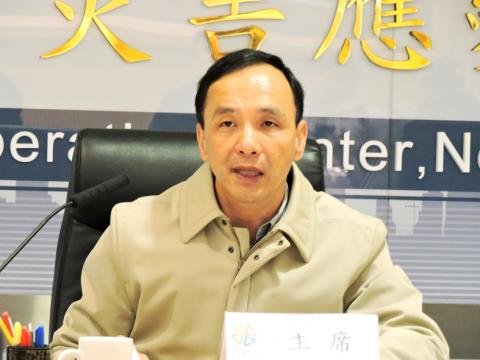The motion to set up a constitutional amendment committee was passed yesterday by the legislature’s Procedure Committee to be placed on the agenda for the next legislative floor meeting on Friday.
The Chinese Nationalist Party (KMT) has taken up long-proposed calls for constitutional amendments after its rout in last month’s nine-in-one elections.
A group of KMT legislators worked last week to align with opposition lawmakers to propose the establishment of a constitutional amendment committee in a bid to solve a constitutional-political impasse said to have led to political upheavals in the past few years.

Photo: Taipei Times
KMT Legislator Johnny Chiang (江啟臣) and Democratic Progressive Party legislators Cheng Li-chiun (鄭麗君) and Lee Chun-yi (李俊俋) sponsored the motions to set up the committee, which according to law must be established to deliberate on revisions and reach resolutions.
KMT caucus whip Alex Fai (費鴻泰) said he expects the proposal to pass on Friday and added that a constitutional amendment team would be set up within the caucus to work out related issues.
The committee, if set up, would be the first since 2004.
Meanwhile, New Taipei City Mayor Eric Chu (朱立倫), the sole contender for KMT chairperson, reiterated that “constitutional amendments are a must.”
Chu has proposed revising the quasi-presidential system to a fully parliamentary system.
However, not everyone in the KMT seemed to like the idea, with Greater Taichung Mayor Jason Hu (胡志強), a KMT vice chairman, saying: “Do not try to abolish the presidential system out of dislike for President Ma Ying-jeou (馬英九).”
Chu did not respond to Hu’s remark directly, but said that dysfunction in the political system has been manifest for the past 20 years and witnessed by everyone in the nation.
He is not the only one who has expressed concern over the current situation, Chu added, saying that the government must be reformed into one that sees power commensurate with accountability.
“[Amendments] should not involve partisan biases and personal calculation,” he said.
Chu said that, regardless of one’s attitude toward the proposed parliamentary system, anyone who is to roll out the amendment project has to speak to academics, experts and politicians from different parties.
Chu said the party would not be ruled by a single person’s dictates or by an unchallenged “supreme leader.”

Chinese Nationalist Party (KMT) Chairman Eric Chu (朱立倫), spokeswoman Yang Chih-yu (楊智伃) and Legislator Hsieh Lung-chieh (謝龍介) would be summoned by police for questioning for leading an illegal assembly on Thursday evening last week, Minister of the Interior Liu Shyh-fang (劉世芳) said today. The three KMT officials led an assembly outside the Taipei City Prosecutors’ Office, a restricted area where public assembly is not allowed, protesting the questioning of several KMT staff and searches of KMT headquarters and offices in a recall petition forgery case. Chu, Yang and Hsieh are all suspected of contravening the Assembly and Parade Act (集會遊行法) by holding

PRAISE: Japanese visitor Takashi Kubota said the Taiwanese temple architecture images showcased in the AI Art Gallery were the most impressive displays he saw Taiwan does not have an official pavilion at the World Expo in Osaka, Japan, because of its diplomatic predicament, but the government-backed Tech World pavilion is drawing interest with its unique recreations of works by Taiwanese artists. The pavilion features an artificial intelligence (AI)-based art gallery showcasing works of famous Taiwanese artists from the Japanese colonial period using innovative technologies. Among its main simulated displays are Eastern gouache paintings by Chen Chin (陳進), Lin Yu-shan (林玉山) and Kuo Hsueh-hu (郭雪湖), who were the three young Taiwanese painters selected for the East Asian Painting exhibition in 1927. Gouache is a water-based

Taiwan would welcome the return of Honduras as a diplomatic ally if its next president decides to make such a move, Minister of Foreign Affairs Lin Chia-lung (林佳龍) said yesterday. “Of course, we would welcome Honduras if they want to restore diplomatic ties with Taiwan after their elections,” Lin said at a meeting of the legislature’s Foreign Affairs and National Defense Committee, when asked to comment on statements made by two of the three Honduran presidential candidates during the presidential campaign in the Central American country. Taiwan is paying close attention to the region as a whole in the wake of a

OFF-TARGET: More than 30,000 participants were expected to take part in the Games next month, but only 6,550 foreign and 19,400 Taiwanese athletes have registered Taipei city councilors yesterday blasted the organizers of next month’s World Masters Games over sudden timetable and venue changes, which they said have caused thousands of participants to back out of the international sporting event, among other organizational issues. They also cited visa delays and political interference by China as reasons many foreign athletes are requesting refunds for the event, to be held from May 17 to 30. Jointly organized by the Taipei and New Taipei City governments, the games have been rocked by numerous controversies since preparations began in 2020. Taipei City Councilor Lin Yen-feng (林延鳳) said yesterday that new measures by